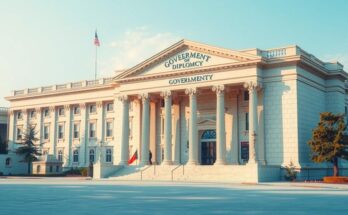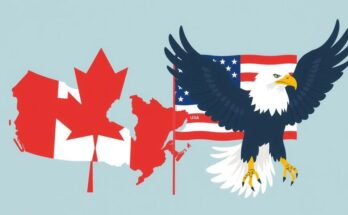In the chaos of President Donald Trump’s executive orders, many alarming actions are overshadowed. Among them is his questionable use of the International Emergency Economic Powers Act (IEEPA) to threaten substantial tariffs on Canada, Mexico, and China, citing grave concerns over illegal immigration and substance abuse. While these issues are serious, framing them as a national emergency seems exaggerated, particularly when solutions are available that don’t provoke a trade war with key partners.
Trump’s perspective hinges on the belief that leveraging tariffs will uniquely harm other nations more than the USA, an idea that neglects the mutual benefits of trade. This approach could lead to higher prices for American consumers and general economic distress for all nations involved—a concept some may liken to economic self-sabotage. History warns us of similar folly; the Smoot-Hawley Tariff is often blamed for exacerbating the Great Depression and is a stark reminder of the repercussions of such policies.
Senator Rand Paul succinctly captures the misguided nature of tariffs, stating, “Tariffs are simply taxes. Conservatives once united against new taxes. Taxing trade will mean less trade and higher prices.” This acknowledgment serves to highlight the flawed economic reasoning behind Trump’s threats. Additionally, the legality of this tariff imposition raises questions, particularly as it diverges from past presidential uses of IEEPA, which typically focused on financial restrictions rather than import taxes.
The frequent invocation of national emergencies poses another critical issue, with many such declarations historically lacking true urgency. The National Emergencies Act aimed to curb excessive executive power, yet without clear definitions of what constitutes a national emergency, it has inadvertently facilitated presidential overreach. The delegation of Congress’s constitutional authority regarding trade to the presidency further complicates matters, highlighting an erosion of legislative control.
In any ensuing legal contest over tariffs, a compelling argument should rest on the non-delegation doctrine, which asserts that Congress cannot hand over its legislative power. Despite the tendency to allocate blame onto the president for misguided policies, the Supreme Court ought to scrutinise the executive’s overstepping in trade matters, thereby compelling Congress to reclaim its essential role in governance.
President Trump is attempting to impose hefty tariffs on key trading partners under IEEPA, framing a national emergency around issues of illegal immigration and drugs. However, this approach could trigger a detrimental trade war, increase consumer prices, and undermine the benefits of international trade. Senator Rand Paul criticises tariffs as taxes, advocating for a return to congressional control over trade policies to prevent executive overreach.
In sum, Trump’s tariff threats represent not only a questionable economic strategy but also a potential legal violation of executive authority. Tariffs, framed as taxes, risk harming American consumers while reigniting trade wars detrimental to all parties. The broader issue encapsulates a concerning trend of congressional forfeiture of power to the presidency, highlighting the necessity for a reassertion of legislative authority in international trade.
Original Source: www.independent.org



